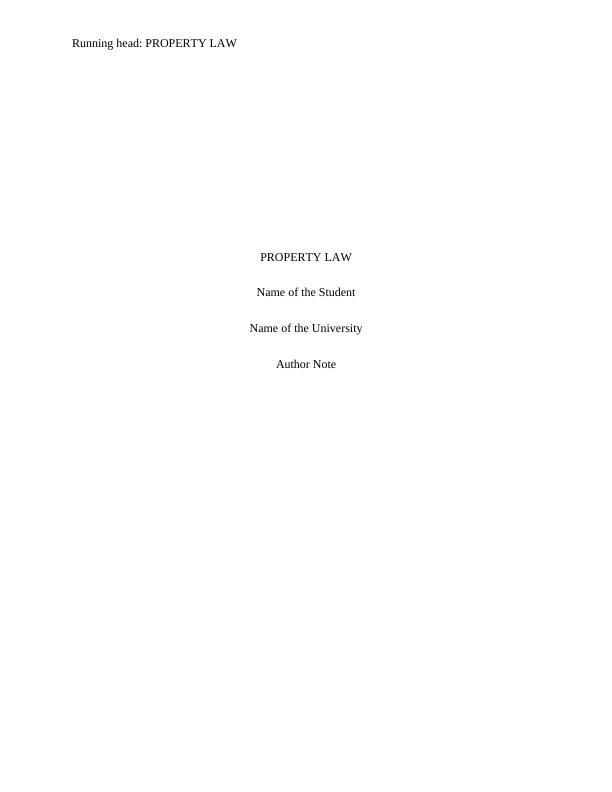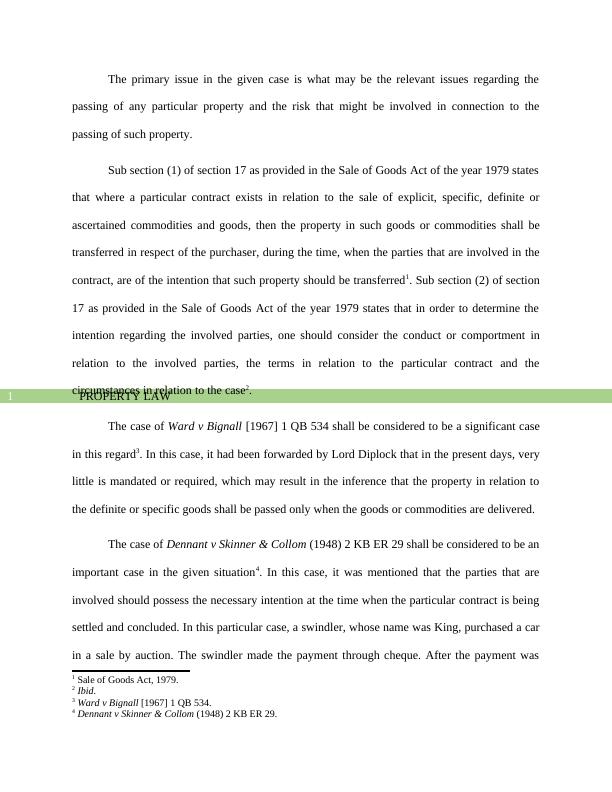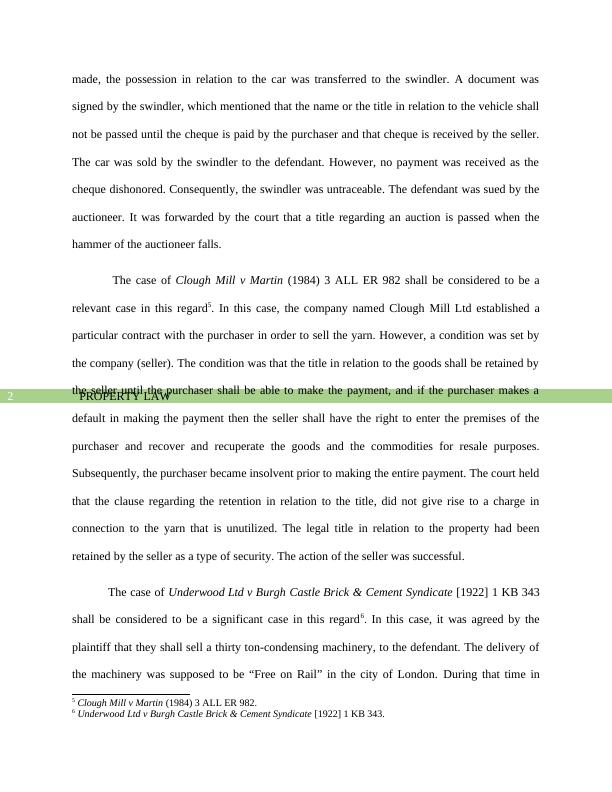Property law || Assignment
Added on 2022-08-15
9 Pages2323 Words15 Views
Running head: PROPERTY LAW
PROPERTY LAW
Name of the Student
Name of the University
Author Note
PROPERTY LAW
Name of the Student
Name of the University
Author Note

PROPERTY LAW1
The primary issue in the given case is what may be the relevant issues regarding the
passing of any particular property and the risk that might be involved in connection to the
passing of such property.
Sub section (1) of section 17 as provided in the Sale of Goods Act of the year 1979 states
that where a particular contract exists in relation to the sale of explicit, specific, definite or
ascertained commodities and goods, then the property in such goods or commodities shall be
transferred in respect of the purchaser, during the time, when the parties that are involved in the
contract, are of the intention that such property should be transferred1. Sub section (2) of section
17 as provided in the Sale of Goods Act of the year 1979 states that in order to determine the
intention regarding the involved parties, one should consider the conduct or comportment in
relation to the involved parties, the terms in relation to the particular contract and the
circumstances in relation to the case2.
The case of Ward v Bignall [1967] 1 QB 534 shall be considered to be a significant case
in this regard3. In this case, it had been forwarded by Lord Diplock that in the present days, very
little is mandated or required, which may result in the inference that the property in relation to
the definite or specific goods shall be passed only when the goods or commodities are delivered.
The case of Dennant v Skinner & Collom (1948) 2 KB ER 29 shall be considered to be an
important case in the given situation4. In this case, it was mentioned that the parties that are
involved should possess the necessary intention at the time when the particular contract is being
settled and concluded. In this particular case, a swindler, whose name was King, purchased a car
in a sale by auction. The swindler made the payment through cheque. After the payment was
1 Sale of Goods Act, 1979.
2 Ibid.
3 Ward v Bignall [1967] 1 QB 534.
4 Dennant v Skinner & Collom (1948) 2 KB ER 29.
The primary issue in the given case is what may be the relevant issues regarding the
passing of any particular property and the risk that might be involved in connection to the
passing of such property.
Sub section (1) of section 17 as provided in the Sale of Goods Act of the year 1979 states
that where a particular contract exists in relation to the sale of explicit, specific, definite or
ascertained commodities and goods, then the property in such goods or commodities shall be
transferred in respect of the purchaser, during the time, when the parties that are involved in the
contract, are of the intention that such property should be transferred1. Sub section (2) of section
17 as provided in the Sale of Goods Act of the year 1979 states that in order to determine the
intention regarding the involved parties, one should consider the conduct or comportment in
relation to the involved parties, the terms in relation to the particular contract and the
circumstances in relation to the case2.
The case of Ward v Bignall [1967] 1 QB 534 shall be considered to be a significant case
in this regard3. In this case, it had been forwarded by Lord Diplock that in the present days, very
little is mandated or required, which may result in the inference that the property in relation to
the definite or specific goods shall be passed only when the goods or commodities are delivered.
The case of Dennant v Skinner & Collom (1948) 2 KB ER 29 shall be considered to be an
important case in the given situation4. In this case, it was mentioned that the parties that are
involved should possess the necessary intention at the time when the particular contract is being
settled and concluded. In this particular case, a swindler, whose name was King, purchased a car
in a sale by auction. The swindler made the payment through cheque. After the payment was
1 Sale of Goods Act, 1979.
2 Ibid.
3 Ward v Bignall [1967] 1 QB 534.
4 Dennant v Skinner & Collom (1948) 2 KB ER 29.

PROPERTY LAW2
made, the possession in relation to the car was transferred to the swindler. A document was
signed by the swindler, which mentioned that the name or the title in relation to the vehicle shall
not be passed until the cheque is paid by the purchaser and that cheque is received by the seller.
The car was sold by the swindler to the defendant. However, no payment was received as the
cheque dishonored. Consequently, the swindler was untraceable. The defendant was sued by the
auctioneer. It was forwarded by the court that a title regarding an auction is passed when the
hammer of the auctioneer falls.
The case of Clough Mill v Martin (1984) 3 ALL ER 982 shall be considered to be a
relevant case in this regard5. In this case, the company named Clough Mill Ltd established a
particular contract with the purchaser in order to sell the yarn. However, a condition was set by
the company (seller). The condition was that the title in relation to the goods shall be retained by
the seller until the purchaser shall be able to make the payment, and if the purchaser makes a
default in making the payment then the seller shall have the right to enter the premises of the
purchaser and recover and recuperate the goods and the commodities for resale purposes.
Subsequently, the purchaser became insolvent prior to making the entire payment. The court held
that the clause regarding the retention in relation to the title, did not give rise to a charge in
connection to the yarn that is unutilized. The legal title in relation to the property had been
retained by the seller as a type of security. The action of the seller was successful.
The case of Underwood Ltd v Burgh Castle Brick & Cement Syndicate [1922] 1 KB 343
shall be considered to be a significant case in this regard6. In this case, it was agreed by the
plaintiff that they shall sell a thirty ton-condensing machinery, to the defendant. The delivery of
the machinery was supposed to be “Free on Rail” in the city of London. During that time in
5 Clough Mill v Martin (1984) 3 ALL ER 982.
6 Underwood Ltd v Burgh Castle Brick & Cement Syndicate [1922] 1 KB 343.
made, the possession in relation to the car was transferred to the swindler. A document was
signed by the swindler, which mentioned that the name or the title in relation to the vehicle shall
not be passed until the cheque is paid by the purchaser and that cheque is received by the seller.
The car was sold by the swindler to the defendant. However, no payment was received as the
cheque dishonored. Consequently, the swindler was untraceable. The defendant was sued by the
auctioneer. It was forwarded by the court that a title regarding an auction is passed when the
hammer of the auctioneer falls.
The case of Clough Mill v Martin (1984) 3 ALL ER 982 shall be considered to be a
relevant case in this regard5. In this case, the company named Clough Mill Ltd established a
particular contract with the purchaser in order to sell the yarn. However, a condition was set by
the company (seller). The condition was that the title in relation to the goods shall be retained by
the seller until the purchaser shall be able to make the payment, and if the purchaser makes a
default in making the payment then the seller shall have the right to enter the premises of the
purchaser and recover and recuperate the goods and the commodities for resale purposes.
Subsequently, the purchaser became insolvent prior to making the entire payment. The court held
that the clause regarding the retention in relation to the title, did not give rise to a charge in
connection to the yarn that is unutilized. The legal title in relation to the property had been
retained by the seller as a type of security. The action of the seller was successful.
The case of Underwood Ltd v Burgh Castle Brick & Cement Syndicate [1922] 1 KB 343
shall be considered to be a significant case in this regard6. In this case, it was agreed by the
plaintiff that they shall sell a thirty ton-condensing machinery, to the defendant. The delivery of
the machinery was supposed to be “Free on Rail” in the city of London. During that time in
5 Clough Mill v Martin (1984) 3 ALL ER 982.
6 Underwood Ltd v Burgh Castle Brick & Cement Syndicate [1922] 1 KB 343.

End of preview
Want to access all the pages? Upload your documents or become a member.
Related Documents
The Sale of Goods Act enforced in the yearlg...
|12
|3164
|14
Commercial Law Problems with Solutions 2022lg...
|10
|2480
|23
Sale of Goods Act: Transfer of Property and Risklg...
|13
|3721
|178
(PDF) Business Law : Assignmentlg...
|16
|3351
|122
Contract and Property Law Assignment PDFlg...
|8
|1917
|43
Report on Sales of Goods Act and Competition Actlg...
|13
|3556
|25